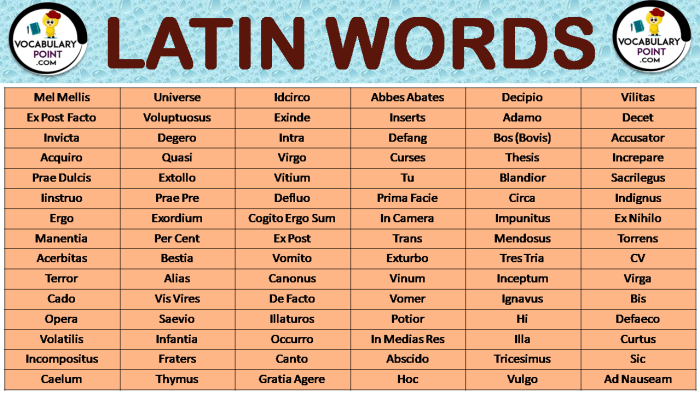Latin words beginning with a – As Latin words beginning with “a” take center stage, this opening passage beckons readers into a world crafted with meticulous attention to detail and a flair for the engaging. The journey that unfolds promises to be both absorbing and distinctly original.
Latin words beginning with “a” hold a wealth of historical significance, having left an enduring mark on modern languages and shaping the very fabric of education and academia. Delving into their etymological origins, we uncover linguistic patterns and rules that govern their formation, revealing the intricate tapestry of prefixes and suffixes that define them.
Historical Significance: Latin Words Beginning With A

Latin words beginning with “a” hold immense historical significance. They have left an enduring mark on modern languages, shaping their vocabulary, grammar, and structure. The influence of Latin on education and academia is equally profound, as it has served as the foundation for many academic disciplines and the language of scholarly discourse for centuries.
In Latin, there are many words that begin with the letter ‘a’, such as ‘amo’ (I love) and ‘amicus’ (friend). One famous Latin phrase that begins with ‘a’ is “o tempora o mores orator” ( o tempora o mores orator ). This phrase, which translates to “O the times, O the morals, orator!”, was used by Cicero to express his dismay at the state of Roman society.
Other Latin words that begin with ‘a’ include ‘aqua’ (water), ‘aurum’ (gold), and ‘argentum’ (silver).
Influence on Modern Languages
- English:A significant portion of English vocabulary originates from Latin, including words like “academy,” “agriculture,” and “animal.” These words have enriched the English language, providing it with a vast and diverse lexicon.
- Romance Languages:Latin is the direct ancestor of Romance languages such as Spanish, French, Italian, and Portuguese. As a result, these languages share a large number of words with Latin, particularly those beginning with “a,” such as “amor” (love), “arte” (art), and “agua” (water).
- Scientific Terminology:Latin has been instrumental in the development of scientific terminology. Many scientific terms, particularly in fields like biology and medicine, are derived from Latin words beginning with “a,” such as “anatomy,” “antibiotic,” and “allergy.”
Role in Education and Academia, Latin words beginning with a
Latin has played a pivotal role in education and academia for centuries. It was the language of instruction in European universities from the Middle Ages to the 19th century, and it continues to be studied in schools and universities around the world as a classical language.
- Classical Education:Latin has been an integral part of classical education, providing students with a foundation in grammar, rhetoric, and literature. It has helped shape the minds of generations of scholars and intellectuals.
- Legal and Medical Professions:Latin terminology is still widely used in the legal and medical professions. Understanding Latin allows professionals in these fields to access original texts and communicate effectively with colleagues around the world.
- Etymology:Studying Latin helps students understand the etymology of words in modern languages, giving them a deeper appreciation for the history and evolution of language.
Etymology and Linguistics

Latin words beginning with “a” have a rich etymological history and follow specific linguistic patterns. These words often trace their origins to Proto-Indo-European (PIE) roots and have evolved over centuries to form the Latin vocabulary we know today.
Prefixes and Suffixes
Many Latin words beginning with “a” share common prefixes and suffixes that contribute to their meaning and grammatical function.
- Prefix “ab-“: Meaning “away from,” “off,” or “apart.” Examples: abire(to go away), abducere(to lead away).
- Prefix “ad-“: Meaning “to,” “toward,” or “near.” Examples: advenire(to come to), adducere(to lead to).
- Suffix “-are”: Denotes an action or state. Examples: amare(to love), parare(to prepare).
- Suffix “-ere”: Denotes an action or process. Examples: agere(to act), ducere(to lead).
Cultural Impact

Latin words beginning with “a” have significantly influenced Western culture, leaving an enduring mark on art, literature, and music. These words have been used to express profound concepts, inspire creative works, and shape the intellectual landscape of the Western world.
Art
In art, Latin words with “a” have been used to convey emotions, ideas, and narratives. For example, the word “amor” (love) has been depicted in countless paintings and sculptures, capturing the essence of human passion. Similarly, the word “anima” (soul) has been used to explore the depths of human consciousness and spirituality in works of art.
Literature
Latin words beginning with “a” have also played a pivotal role in literature. From the epic poems of Virgil to the sonnets of Shakespeare, Latin has provided a rich vocabulary for expressing complex emotions, philosophical ideas, and literary themes. The word “amor,” for instance, has been used by poets to explore the complexities of love, while the word “amicus” (friend) has been employed to depict the bonds of friendship and loyalty.
Music
Latin words with “a” have found their way into music as well. The word “alleluia” (praise God) is a common refrain in religious music, while the word “a cappella” (without accompaniment) is used to describe unaccompanied choral singing. Additionally, the word “adagio” (slowly) is a musical term that indicates a slow and expressive tempo.The
influence of Latin on Western culture cannot be overstated. Latin words beginning with “a” have permeated various aspects of human expression, from art to literature to music. These words have helped shape the cultural landscape of the Western world, providing a rich vocabulary for expressing complex emotions, ideas, and narratives.
Practical Applications

Latin words and phrases with the letter “a” have found widespread use in various fields. Let’s explore their practical applications in everyday communication.
Common Latin Words Beginning with “a”
Here’s a table showcasing some common Latin words beginning with “a” and their English translations:
| Latin Word | English Translation |
|---|---|
| a cappella | without accompaniment |
| ad hoc | for this purpose |
| a fortiori | with even stronger reason |
| a posteriori | from the effect to the cause |
| a priori | from the cause to the effect |
Latin Phrases and Idioms Beginning with “a”
Latin phrases and idioms add a touch of sophistication and precision to our language. Here’s a list of some notable ones:
- a capella: singing without instrumental accompaniment
- ad hoc: created for a specific purpose
- a fortiori: even more strongly or convincingly
- a posteriori: based on experience or observation
- a priori: based on reason or deduction
- ab initio: from the beginning
- ad infinitum: forever or indefinitely
- ad nauseam: to the point of disgust
Usage in Everyday Communication
Incorporating Latin words and phrases into our conversations can enhance clarity and precision. Here are some examples:
- The choir sang a cappella, their voices filling the hall with harmony.
- We formed an ad hoccommittee to address the issue.
- A fortiori, if the team is capable of winning the regional tournament, they can surely succeed at the national level.
- The scientist’s conclusion was based a posteriorion years of research.
- The teacher’s argument was based a priorion logical reasoning.
Commonly Asked Questions
What is the historical significance of Latin words beginning with “a”?
Latin words beginning with “a” have played a pivotal role in shaping modern languages, serving as the foundation for countless words in English, Spanish, French, and other Romance languages. They have also been instrumental in the development of scientific and academic terminology, leaving a lasting legacy in fields such as medicine, law, and philosophy.
How can I use Latin words beginning with “a” in everyday communication?
Latin words beginning with “a” offer a wealth of expressive options for everyday communication. Consider using “ad hoc” for impromptu events, “a priori” for prior knowledge, or “a fortiori” to strengthen an argument. By incorporating these words into your vocabulary, you can add a touch of sophistication and precision to your speech and writing.

